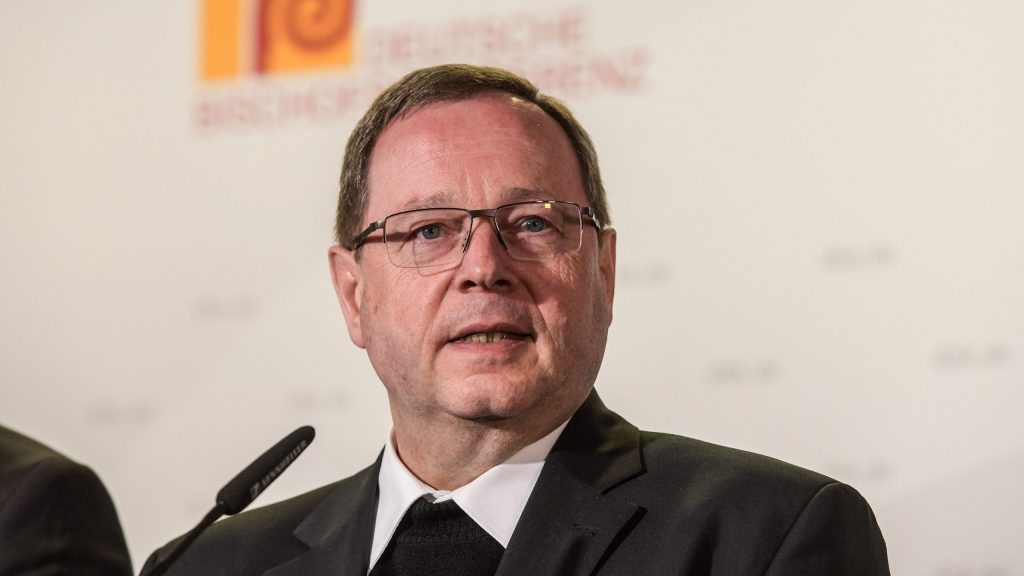There’s a sense in which Germany has become to Church politics what California is on the American scene, meaning a strongly blue state which tends to favor the most progressive choice on any menu.
On Tuesday night, California by itself turned what otherwise would have been a Super Tuesday disaster for Senator Bernie Sanders into a mere setback, keeping his Democratic Socialist crusade for the presidency alive.
In somewhat similar fashion, Germany’s Catholic bishops went to the polls the day before, and they, too, embraced a progressive as their new leader. To replace Cardinal Reinhard Marx of Munich, who’s served as president of the German bishops’ conference since 2014, they chose Bishop Georg Bätzing of Limburg.
Bätzing, 58, reflects the broadly reform-minded, progressive ethos of the German church. He’s vocally defended a controversial plan for a two-year “synodal process” in Germany, which brings together bishops and laity from the powerful Central Committee of German Catholics. A preliminary assembly was held Jan. 30-Feb. 1, with key themes including power in the Church, priestly life (including the issue of celibacy), women in ministries and sexual morality.
Critics worry that the process will devolve into a doctrinal free-for-all creating false expectations of change, but Bätzing has insisted it’s important to have a space in which contentious issues can be discussed.
“I stand for this completely and utterly,” Bätzing said during a news conference after his election, referring to the synodal process. “I am very convinced that this is a way of practicing a new togetherness of laity and bishops in the German church.”
While not openly advocating the ordination of women to the priesthood, Bätzing has said the Catholic Church needs to appreciate why many modern people finds its refusal to take that step incomprehensible. According to the official news site of the German bishops’ conference, Bätzing has also said that in the future priestly celibacy perhaps should be optional rather than mandatory.
Last year, Bätzing called for an open discussion in his Limburg diocese over blessing same-sex unions, creating a group to carry the conversation forward. He also headed up a preparatory commission for the German synodal process on the subject of sexual morality, producing a document that struck a tolerant note on contraception, masturbation and homosexuality.
All, naturally, are positions that will endear Bätzing to Church liberals and position him to become a new bête noire for the Catholic right. One hint in that direction is that LifeSiteNews carried a lengthy piece on Bätzing after his election, contrasting his positions (unfavorably) with the Catechism of the Catholic Church.
None of this should be surprising given the general tenor of the German bishops’ conference, and certainly no one can object that Bätzig hasn’t paid his pastoral dues. In Limburg, he took over from embattled Bishops Franz-Peter Tebartz-van Elst, the notorious “bling bishop” forced to resign amid backlash over an extensive remodeling and building project with costs eventually estimated at around $35 million, had it been brought to completion.
(In a footnote, Tebartz-van Elst eventually got a gig in Rome as an official of the Pontifical Council for Promoting the New Evangelization, after the Vatican’s Secretariat of State brokered a deal so his former diocese wouldn’t sue him in an effort to get some of its money back.)
Bätzing thus inherited a diocese in freefall, and by all accounts largely has managed to restore calm. No doubt his election, to some extent, amounts to an “attaboy” from his fellow bishops for having taken on a thankless job and exceeding expectations.
The analogy between the German church and California is apt in another sense: Both are huge players with massive influence on the larger polities to which they belong.
California, as is well known, has the largest number of electoral votes in the nation, 55 out of 538, due to its large population. It’s also an economic powerhouse - in fact, if California were an independent nation, it would have the seven largest economy in the world.
That would put the Golden State just three spots behind Germany, as it turns out, the fourth-largest economy in the world. That wealth is reflected in the German Catholic Church, which, due to the country’s church tax system, benefits from significant public funding and operates a massive infrastructure.
German Catholicism actually is the second-largest private employer in the country after Volkswagen, and, through foundations such as Misereor and Adveniat, Germany also exercises considerable influence on the church in regions such as Latin America, Asia and sub-Saharan Africa.
Yet there’s a final term of comparison between Germany and California which might give Catholics in Deutschland just a bit of pause.
Precisely because California is politically predictable, it’s also virtually ignored. Since both campaigns will know going in which way California will go in November, neither will spend much time or money there, neither will bend over backwards trying to discern what Californians want and delivering it to them, and neither will be especially solicitous of California perspectives. The battle for the American future will be fought elsewhere, in venues which are less ideologically aligned and therefore potentially open to appeals from either party.
In a similar key, one could argue that while the contest for the direction of Catholicism may be largely over in Germany, that’s hardly true in much of the rest of the world, and therefore parties interested in steering things one way or the other probably wouldn’t be focusing much on Germany right now.
By running up the score at home, in other words, Catholic liberals in Germany may also be reducing their leverage in the global game - unless, that is, their new leader finds a different way to project influence.

